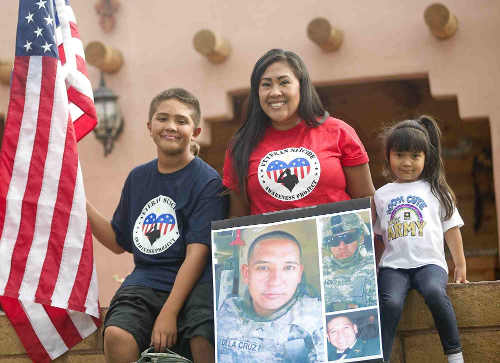
NORTH COAST, Calif. – Two young women are at the heart of a new effort that seeks to bring awareness to the problem of suicide among veterans while addressing suicide's enduring stigma.
Cassie Shapiro of Petaluma and Evita De La Cruz of Oak Hills have taken on the campaign because both lost husbands to suicide and so have experienced the tragedy firsthand.
While both are continuing the process of grieving and understanding their husbands' struggles, they want to help others facing the same challenges and, at the same time, prevent more deaths through a new organization De La Cruz founded in July, the Veteran Suicide Awareness Project.
A definitive veteran suicide rate remains an issue that appears to be in dispute among health experts, with studies in recent years offering different possible numbers and conclusions.
However, some recent data suggests a spike in suicides among younger veterans of Iraq and Afghanistan, and that suicide deaths among members of the military are far higher than the general population. Still other reports assert that thorough research needed to arrive at solid numbers is lacking.
Shapiro and De La Cruz said people are reaching out to them to share their own stories and to offer support, and on the Veteran Suicide Awareness Project Facebook page there are numerous reports from individuals about friends and family members in the military who died by suicide.
The organization also aims to offer assistance for the families of veterans who die by suicide, who De La Cruz said often are excluded from the help offered to other military families that experience a service member's death.
Fundraising efforts include t-shirt sales and a “ruck march” to raise awareness. The first was held in September – which is Suicide Prevention Awareness Month – in Southern California and another in Rohnert Park is scheduled for this Saturday, Nov. 14, from 8:30 to 11:30 a.m. at Sunrise Park, 5301 Snyder Lane.
A wife searches for answers
Cassie Shapiro met her husband, Steven, when she was 17 and he was 21. By that time, Steven Shapiro had already been through a lot in life. He never knew his father, who his mother had met while they were serving in the Air Force at Edwards Air Force Base. After his mother was discharged, his father was sent to Germany.
His mother later died by suicide, and so he spent most of his life in foster care after authorities couldn't track down his father. When he was 18, the woman who had been his only foster mother died, leaving him on his own. His wife said he considered himself homeless, staying on couches and working odd jobs.
“It was very rough and rocky up until he and I started dating,” Cassie Shapiro said. “He wasn't very open with his life and what he had gone through.”
They didn't start dating until Cassie was 23. Steven Shapiro met Cassie's parents – who live in Hidden Valley Lake – and enjoyed spending time with her father, an Army veteran and a member of the National Guard. A few months into the young couple's' relationship, he went with her father to a recruiting station in Santa Rosa and signed up to go into the Army.
The couple married at the end of December 2009, and that following March Steven Shapiro left for basic training in Fort Knox, Kentucky. After basic training, he was assigned to Fort Hood, Texas. Cassie Shapiro said her husband came back to Lake County, they packed her things and drove to Texas.
At the start of February 2011 Steven Shapiro deployed for Iraq. After he left, his wife found out she was pregnant with their son – happy news she gave him over the phone when he landed in Kuwait. They then decided it was best for her to move back to Hidden Valley Lake to stay with her parents.
When their son was born at the end of September 2011, Steven Shapiro came home on a two-week leave so he could be home for the birth.
When he went back to Iraq, he received news from his unit that they were returning to the United States within a week, and his wife said he went to work preparing to depart for Iraq while she started making arrangements to move with her son back to Texas.
But, on Oct. 21, 2011, just a few days before he was set to return from his assignment supporting Operation New Dawn, Army Private First Class Steven Shapiro – assigned to the 3rd Battalion, 8th Cavalry Regiment, 3rd Advise and Assist Brigade, 1st Cavalry Division as an M1 armor crewman – died at age 29.
At the time, Army officials said publicly that his death was the result of a “noncombat related incident,” and that it was under investigation. Few details were made available to his family.
While his wife was told how he died, she was told not to mention it to the press. “Things have changed a lot since then,” Cassie Shapiro said, noting now there is more awareness and more people are talking openly about the issue of suicide among veterans and active duty service members.
After her husband's death, Cassie Shapiro said she received a lot of support from friends and neighbors in the Hidden Valley Lake and Middletown communities.
“The entire town lined the streets for my husband,” she said, breaking down, recalling the procession for the return of his body.
For the community to show so much love and support for him, “it meant more than I can even describe in words,” she said. “It's amazing what a small town can do.”
She added, it was like “getting a big hug from everyone.”
One of the first people to reach out to her was Gold Star mother Denise Wilson of Clearlake, whose son Ivan died in Afghanistan in June 2008.
The investigation the Army eventually would complete didn't pinpoint what caused Steven Shapiro to commit suicide, Cassie Shapiro said.
“There really were no signs,” she said, recounting they had been on Skype earlier on the day he died, discussing preparations for reuniting in Texas.
While the couple was financially stable, had a solid marriage and a new baby – Steven Shapiro had always wanted his own family – his wife believes his death was a combination of many things.
For one, she said the transition from “soldier mode” to a home visit took him almost the entire two weeks that he was home for their son's birth. He had only just started to relax when he had to return to Iraq.
There also has been another sign of trouble – upon his return to Iraq, he had been red-flagged during a mental health screening and told to get assistance. She later found out he had reached out to a rabbi, who wasn't able to connect with him before his death.
It was several months after his death that a colonel and a lieutenant colonel visited Cassie Shapiro's Sonoma County home to hand her a copy of the investigative report into her husband's death. She found out that he had left a note, saying he loved her and that he was feeling depressed, but he gave no reason for the decision to take his life. “That was it.”
She said it took more than a year for the Army to finally release to her all of his belongings, including his cell phone, laptop and external hard drive.
Cassie Shapiro said she has received a lot of support over the years. Through that network of support she and De La Cruz would meet online in a support group, meeting in person in February at a retreat for widows in Southern California.
“We automatically clicked,” De La Cruz recalled.
Their shared experience helped make the connection and build the bond.
Seeking to save others
Like Shapiro, De La Cruz was left a young widow with young children, and had to move forward and find answers – or, at least, start the search – on her own.
De La Cruz and her husband, James, a native of Houston, Texas, met while they both served in the military in Iraq – he a sergeant in the Army, she as an Air Force Reserve medic.
During their initial deployments, he was in Iraq for a year – “outside the wire,” in the combat zone – while she was there for six months, working on the base.
They were married in December of 2010 and their daughter was born the following April. The were based at Fort Hood.
James De La Cruz was deployed for the second time to Iraq when his daughter was 3 months old, which meant that he watched her grow up on Skype, his wife said. The couple also was raising her son from a previous relationship.
By the time her husband was deployed that last time, Evita De La Cruz said she knew he had post traumatic stress disorder. He returned home in July 2012.
Not long before he died at age 29 on Jan. 13, 2013, he had made comments both to his wife and other family members about committing suicide. It nonetheless came as a shock to his wife.
She said it took her more than a year to be able to accept that her husband died by suicide. “I would do anything I could to not say it,” she said. “It's such a stigma.”
However, through her own journey – which has included therapy and connecting with others who have endured similarly tragic circumstances – she said she came to understand that her husband's manner of death doesn't define who he was as a man, father and husband. She said she wants others to understand that as well.
He loved his country and he served with pride, she said.
“The suicide wasn't who my husband was. That wasn't who Cassie's husband was,” she said.
And their manner of death, she added, “doesn't mean that they shouldn't be honored.”
De La Cruz said she's also now had the opportunity to talk about the subject of suicide on military bases, which has been healing for her.
One of the problems her husband faced, she said, was that he didn't want to be seen as weak or to admit he had a problem for fear of repercussions.
Earlier this year, when she decided to start her organization, De La Cruz said she wanted Shapiro to join her in the effort, explaining that there was no one better to help because of her firsthand experience.
“She's my other half,” De La Cruz said of her friend.
Once De La Cruz decided to start the nonprofit organization, “She got to work right away,” said Shapiro. When De La Cruz, the president, asked her to be her vice president, “I gladly accepted, without hesitation,” Shapiro added.
They've already received a lot of support in a short amount of time, Shapiro said. In addition to future ruck marches – with the potential for up to four annually – there also are plans for a catfish tournament in May to support the organization.
De La Cruz said the money they are raising will go toward holiday boxes for children who lost veteran parents to suicide. “We have 22 families that we're going to be picking, but I would like to double that,” she said. “A lot of these families are struggling.”
The Nov. 14 ruck march will be the last one Shapiro can do on the North Coast, as she's planning to move from Petaluma to Texas to start nursing school. She's received help in her plans through the Army's Survivor Outreach Services program.
De La Cruz said she decided that she wanted to take the life she's been given and make something positive out of it, and in so doing try to prevent others from suffering the same.
If they can help at least one person not to take their own life, and spare other families from experiencing the pain of that loss, “Then our husbands did not die in vain,” De La Cruz said.
For more information about the Veteran Suicide Awareness Project, visit the Web site, the Instagram account @veteransuicideawarenessproject , the Facebook page, email This email address is being protected from spambots. You need JavaScript enabled to view it. or call De La Cruz at 760-713-4471.
Email Elizabeth Larson at This email address is being protected from spambots. You need JavaScript enabled to view it. . Follow her on Twitter, @ERLarson, or Lake County News, @LakeCoNews.











